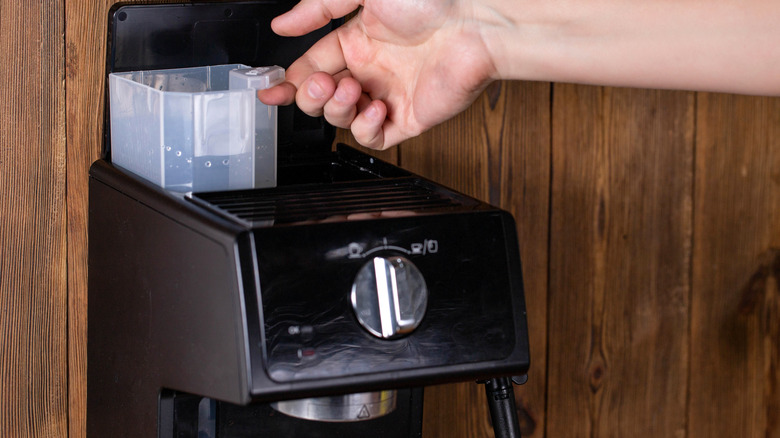Why You Should Check Your Nespresso Machine's Water Levels Before Brewing
There's no point crying over spilled milk, but a broken coffee machine is a whole other ballgame. Therefore, you should check your Nespresso's water levels before you start brewing. Aside from the fact that you'll get zero coffee in your cup, sufficient water levels are vital for temperature regulation. Accidentally pressing start on an empty tank can severely impact machines. There's a great danger of overheating, risking a fire, or internal damage like broken pump mechanisms. Models that rely on pressurized brewing may also suffer airlocks.
Running a brew on an empty tank is one of the top mistakes to avoid when using your Nespresso machine. However, running out of water mid-cycle can be a pain too. Be wary of older models that don't restart after reaching empty, even when you add more to the tank. You'll quickly burn through expensive pods, having to restart the whole process. It might be worth upgrading your Nespresso if you repeatedly struggle with managing water levels. Newer machines automatically prevent you from brewing on empty and allow pausing cycles for tank refills.
What else can go wrong with Nespresso water tanks?
Many Nespresso tank issues are easily avoided by simply following water level stipulations. However, there are a few extra things to consider, like learning why you should be filling your Nespresso machine with purified water. In this case, hard water can play havoc inside your machine and create a stubborn limescale crust that demands regular descaling. Using purified options alternatives avoids these harmful elements and minerals.
Another common problem is leaking. Your first fear may likely be that a crack has developed, but rest assured, the usual culprit is simply a poorly connected water tank. Give it a thorough examination and a wiggle to ensure it's sitting in place.
Realistically, preserving your machine is all about maintenance and proper usage. Give your Nespresso the care it deserves with a weekly clean cycle, but don't create extra work for yourself or, worse, accidentally cause long-term damage. Looking after your water tank is a great first step to preserving a machine's longevity.

